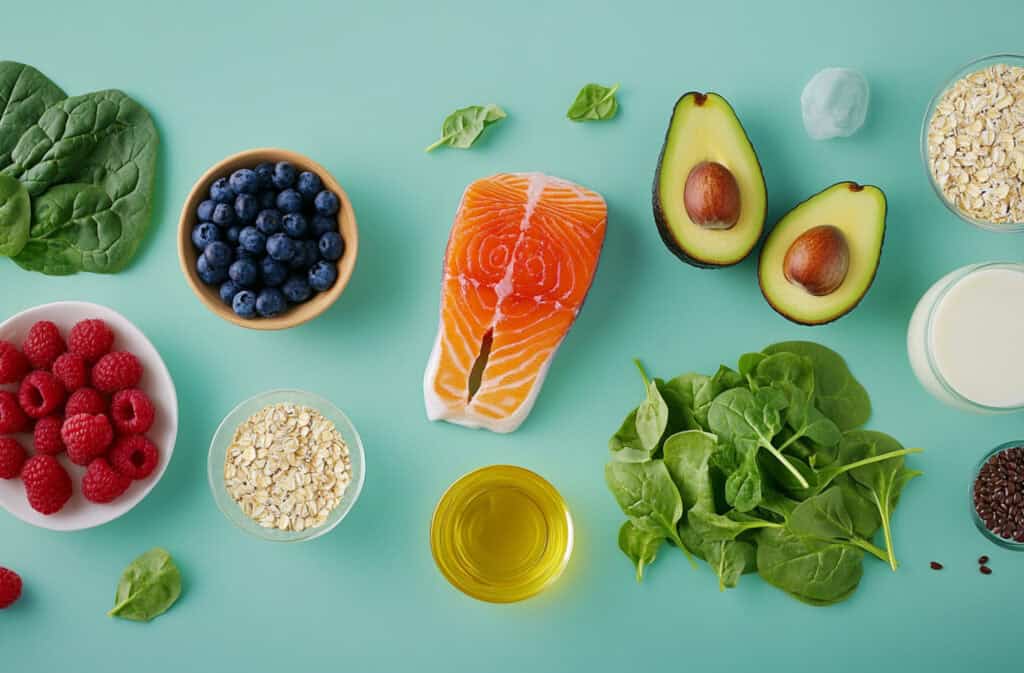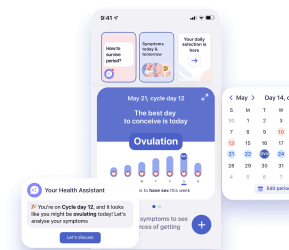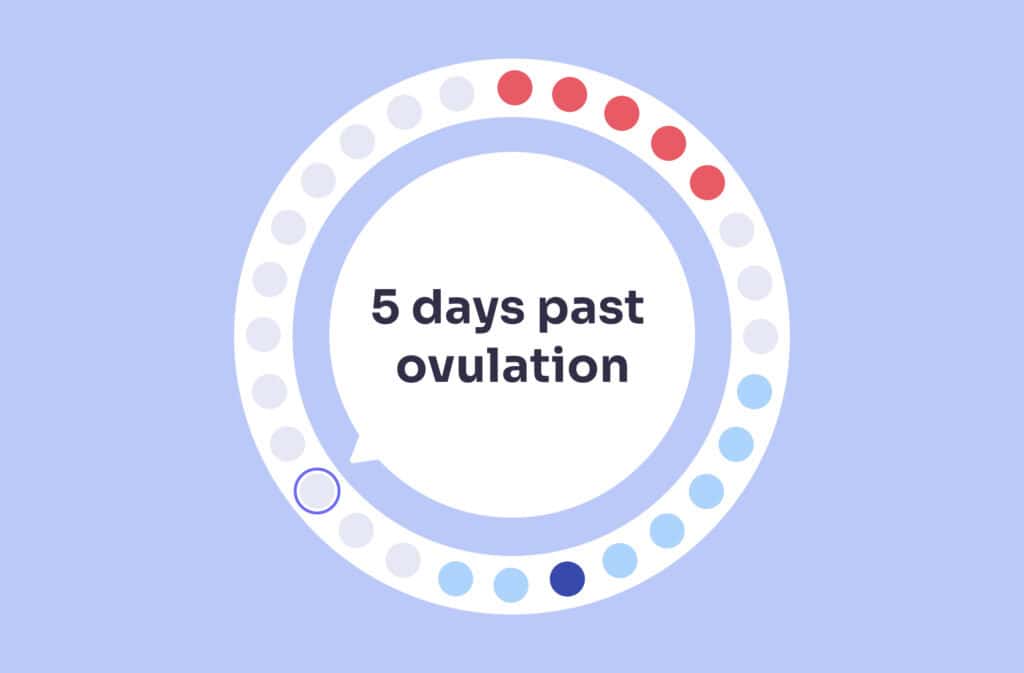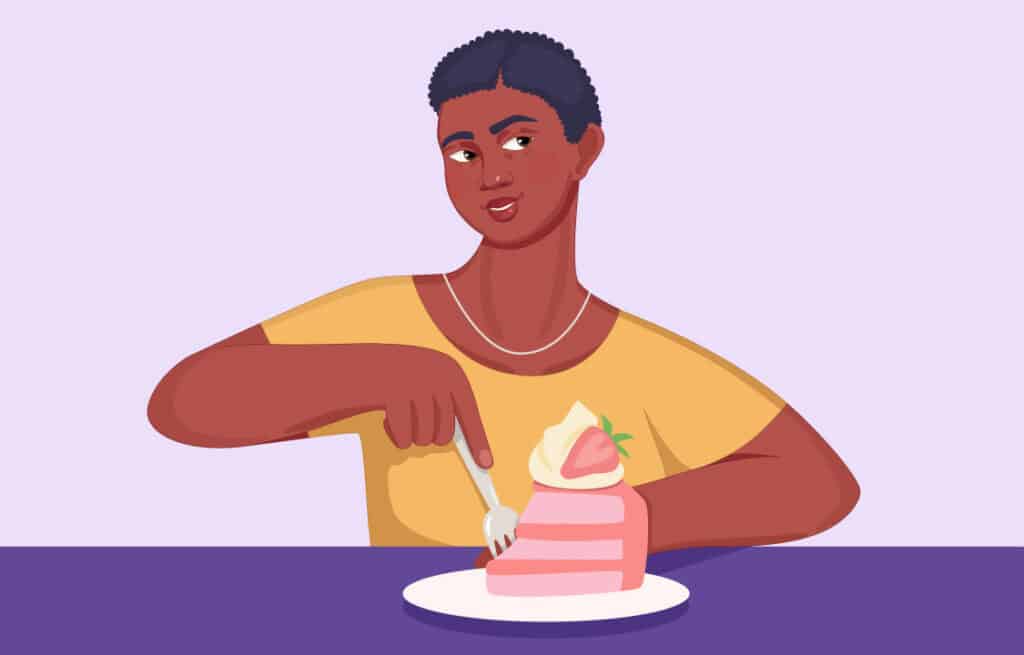Femia > Health Library > Getting Pregnant > Trying to conceive > Fertility diet: What to eat to boost your chances of getting pregnant
Fertility diet: What to eat to boost your chances of getting pregnant

- Updated Mar 2, 2025
- Published
CRAFTED BY HUMAN
Crafted by human At Femia, we provide accurate and up-to-date information at every stage of your journey, from trying to conceive, pregnancy and postnatal support. All content is created by a real person based on in-depth research and own professional experience. Femia ensures that you will receive expert advice, strict accuracy and a personalized approach from our authors/medical experts. Learn more about our editorial policy.
FACT CHECKED
Fact checked At Femia Health, we maintain the highest standards of editorial excellence in delivering content focused on helping you conceive, guiding you through pregnancy, and supporting you postpartum. Explore our content review principles to learn how we ensure the accuracy and quality of our health and lifestyle tips for every stage of your journey.
- A balanced diet can significantly boost fertility by supporting hormone balance, egg quality, and ovarian function. Focus on consuming leafy greens, berries, whole grains, lean proteins, healthy fats, dairy or alternatives, and omega-3 rich foods.
- Avoid foods that may hinder fertility, such as those high in sugar, trans fats, mercury, and ultra-processed items. Limit alcohol and caffeine intake as well.
- Complement your fertility diet with lifestyle factors like regular low-impact exercise, proper hydration, adequate sleep, and effective stress management techniques.
A growing body of evidence links fertility levels to women’s dietary habits while trying to conceive (TTC). Foods that are filled with added sugars, trans fats, and other elements that are generally unhealthy for you can have an adverse effect on your chances of getting pregnant. On the other hand, a healthy and well-balanced diet can help prevent nutrient and vitamin deficiencies and assist you on your conception journey.
From this article, you’ll learn about the specific effects of eating habits on your chances of conceiving, plus find a list of fertility-boosting foods that might help. We’ll also give you a sample seven-day fertility diet plan along with some practical advice on incorporating positive eating and lifestyle changes to make your TTC journey more efficient.

How diet affects fertility
The foods we consume on a daily basis have multiple effects on our look, mood, and internal health. From the reproductive point of view, your dietary choices might affect your hormone balance, egg quality, ovarian functions, and overall reproductive system.
Different dietary compounds have varying effects. For example, carbohydrates affect your insulin sensitivity and glucose metabolism. Regular consumption of high glycemic index products can increase insulin resistance and lead to enhanced dyslipidemia and oxidative stress, which might degrade ovarian functions.
Fats also play an important role in your reproductive hormones. Studies suggest that a high dietary fat intake can impair female hypothalamic-pituitary-ovarian (HPO) axis functionality, change cycle length, and disrupt hormone concentrations.
Conversely, if you consume healthy nutrients (e.g. monounsaturated and polyunsaturated fats instead of trans fats) and balance their ratio in your diet, it can support your hormones, cycle, and reproductive system as a whole, boosting the likelihood of conception.
👉Find out more: How to recognize signs of high fertility in a woman: A detailed guide
Top fertility-boosting foods
Choosing the right foods can help support your body with the vitamins, antioxidants, and nutrients needed to ensure optimal conditions for conception.
Here’s a list of the seven best foods to increase fertility:
- Leafy greens. This group of foods spans products like spinach, kale, cabbage, and other greens. These foods are known for containing fiber, magnesium, iron, calcium, and potassium. Together, these nutrients create a powerhouse that enhances blood quality, helps regulate hormone levels, and supports overall health. Leafy greens are also rich in folic acid, known as one of the most pivotal nutrients to take before and during pregnancy.
- Berries. Different berries are excellent sources of natural antioxidants and anti-inflammatory phytonutrients, which are crucial for optimal reproductive and gestational health. They can help supply your body with potassium, magnesium, vitamins C and K, fiber, and prebiotics. Some berries (including blueberries, strawberries, and raspberries) are also among the top fruits rich in folic acid.
- Whole grains. This group of fertility foods includes brown rice, quinoa, oats, and other grains that are rich in fiber. Fiber is known to stabilize blood sugar levels. Most importantly, it’s linked to better hormone metabolism, supported ovulation, and a greater probability of conception and implantation.
- Lean proteins. Protein is responsible for the production of hormones that regulate your menstrual cycle (luteinizing hormone and follicle-stimulating hormone). It’s also needed to produce healthy eggs, support conception and implantation, and ensure further maternal tissue growth and blood volume expansion. To create an effective fertility diet meal plan, choose lean protein sources, such as eggs, fish, chicken, lentils, etc.
- Healthy fats. Healthy fats that come from products like seeds, nuts, and avocados are known to help deliver fat-soluble vitamins (e.g. A, D, E, and K). When integrated into your diet wisely, fats can support hormone production, reduce inflammation, and improve egg quality. However, it’s important to keep fat levels balanced, because a high-fat diet can result in adverse effects.
- Dairy or dairy alternatives. High-fat dairy products are rich in estrogen and fat-soluble vitamins, which is why they are often linked to increased fertility. Dairy-derived fat is also known to contain trans-palmitoleic acid, which can improve insulin sensitivity and positively affect your overall health, not to mention the well-known benefits of dairy for your bones, muscles, teeth, skin, vision, and nerves.
- Foods rich in omega-3 fatty acids. The last category of the best foods for fertility includes omega-3-rich products like salmon, flaxseed, and others. Omega-3 fatty acids are generally known for numerous health benefits. In terms of fertility and reproductive health, they are proven to regulate hormones, enhance blood flow to the uterus, reduce inflammation in your body, and support embryo implantation.
👉Find out more: Enhancing fertility naturally: A guide to fertility supplements and foods for women
Foods to avoid when trying to conceive
Now that you know what to eat to get pregnant faster, let’s quickly discuss some foods that are recommended to avoid during your TTC journey:
- Excessive sugar. Although we need sugar to get enough energy, consuming too much sugar makes insulin levels spike, which may interfere with egg maturation and ovulation.
- Trans fats. Studies find that calories gained from trans fatty acids might result in hormonal imbalance and skipped periods, which can eventually lead to a higher risk of ovulatory infertility.
- High-mercury fish. While many fish options are safe and recommended as part of a balanced and healthy fertility diet, some fish, including king mackerel, swordfish, and shark, are known to contain a lot of mercury, which is sometimes linked to infertility and subfertility. It’s recommended to avoid such high-mercury foods both before and during pregnancy.
- Ultra-processed foods. Ultra-processed foods like ready meals or crisps often contain excessive salt, sugar, and saturated fat. Such products can cause oxidative stress and inflammation, lead to hormonal imbalance, and create nutrient deficiencies.
In addition to these products, it’s highly recommended that TTC females limit alcohol and caffeine intake to increase the likelihood of conception and ensure optimal pre-pregnancy health.
Sample fertility diet plan
When planning a pregnancy, you’ll likely want to implement certain diet changes to increase the likelihood and speed of conception. Although the basic nutrition concepts are pretty simple and generally well-known, developing a healthy fertility diet might feel a little confusing at first.
To help you get on the right track, we’ve prepared a sample one-week fertility diet meal plan that you can try or use for inspiration.
| Breakfast | Lunch | Dinner | Snack options | |
|---|---|---|---|---|
| Monday | Whole grain bagel with salmon, lettuce, tomatoes, and cheese | Homemade burrito with grilled chicken breast, beans, tomato, red pepper, corn, and brown rice | Lentil soup | A handful of mixed dried fruits/nuts |
| Tuesday | Chia seed pudding with berries of your choice | Vegetarian chili | Fresh trout filet baked with tomatoes, greens, and olives | Veggies and hummus |
| Wednesday | Whole grain toast with soft-boiled egg and avocado | Baked bell peppers stuffed with quinoa and veggies | Baked sweet potatoes with ground turkey | Homemade granola bar |
| Thursday | Oatmeal topped with fruits, nuts, and cinnamon | Vegan chickpea curry, jacket potatoes | Chicken fajitas | String cheese |
| Friday | Scrambled eggs with greens and smoked salmon | Chicken broccoli soup | Whole grain pasta with pesto | Fresh fruits/berries |
| Saturday | Breakfast bowl with granola, flaxseed, berries, and nuts | Mixed green salad with a chicken club sandwich | Grilled salmon with asparagus | Roasted chickpeas |
| Sunday | Cottage cheese with fruit | Tacos with whitefish and vegetables of your choice | Mediterranean farro salad | Whole grain crackers with cheese |
Tips for implementing a fertility diet
Using our sample weekly plan as a guide, feel free to adjust it to your specific likes and dislikes. In any case, most likely, you will need to implement a longer diet to achieve your goal.
So, how do you establish, let’s say, a 28-day diet plan to get pregnant and stick to it?
Here are a few tips that can help:
- Have a plan. It can help a lot to have your meals written down, day by day. If you have a daily dietary plan, you won’t have to ponder what to eat every time, which can help minimize making poor choices.
- Always make a shopping list. Create your weekly shopping lists mindfully, with your dietary plan in mind. This can help you save time at the grocery store and ensure that you buy the right products to cook healthy, balanced food to boost fertility.
- Don’t keep unrecommended foods at home. If you are used to storing lots of sweets, processed foods, and other unhealthy products at home, it might be helpful to get rid of them. If you don’t have them within your reach, it can be easier to stay away from such foods.
- Make meal prepping a habit. Preparing your meals can save you lots of time and also ensure that you stick to your diet plan.
- Limit how often you eat out. When you go out, it can be hard to pick proper meal options. Thus, it can help you get used to eating healthier if you restrict how often you eat out (at least at the start).
- Seek healthy alternatives. If you’re trying to conceive and have to change your diet, it doesn’t mean that you have to prohibit yourself from everything you like. You can look for healthier alternatives to foods you would eat normally. For example, if you love soda, try replacing it with fresh juices, fruit water, and other options. To replace sweets with lots of trans fats, you can opt for dried fruits, dark chocolate, etc.
👉Find out more: Best fertility exercises: Yoga, workouts, and more to boost fertility
References
- Skoracka K, Ratajczak AE, Rychter AM, Dobrowolska A, Krela-Kaźmierczak I. “Female Fertility and the Nutritional Approach: The Most Essential Aspects.” Adv Nutr, 1, Dec. 2021. https://www.ncbi.nlm.nih.gov/pmc/articles/PMC8634384/.
- Hohos NM, Skaznik-Wikiel ME. “High-Fat Diet and Female Fertility.” Endocrinology, 1, Aug. 2017. https://www.ncbi.nlm.nih.gov/pmc/articles/PMC6283234/.
- “Vitamins, supplements and nutrition in pregnancy.” The National Health Service (NHS), 1, Sept. 2023. https://www.nhs.uk/pregnancy/keeping-well/vitamins-supplements-and-nutrition/#:~:text=Folic%20acid%20before%20and%20during,tube%20defects%2C%20including%20spina%20bifida.
- Gaskins AJ, Chiu YH, Williams PL, Keller MG, Toth TL, Hauser R, Chavarro JE; EARTH Study Team. “Maternal whole grain intake and outcomes of in vitro fertilization.” Fertil Steril, Jun. 2016. https://www.ncbi.nlm.nih.gov/pmc/articles/PMC4894002/.
- Chavarro JE, Rich-Edwards JW, Rosner B, Willett WC. “A prospective study of dairy foods intake and anovulatory infertility.” Hum Reprod, May, 2007. https://pubmed.ncbi.nlm.nih.gov/17329264/#:~:text=Conclusions%3A%20High%20intake%20of%20low,of%20intake%20levels%20in%20humans.
- Misia Landau. “Trans Fats May Raise Risk of Infertility.” Harvard Medical School, 9, Feb. 2007. https://hms.harvard.edu/news/trans-fats-may-raise-risk-infertility.
- Magda Carvalho Henriques, Susana Loureiro, Margarida Fardilha, Maria Teresa Herdeiro. “Exposure to mercury and human reproductive health: A systematic review.” Reproductive Toxicology, Science Direct, Apr. 2019. https://www.sciencedirect.com/science/article/abs/pii/S0890623818302442#:~:text=Results,abnormal%20sperm%20morphology%20and%20motility.
- “Ultra-processed foods and fertility.” Bourn Hall Fertility Clinic, 15, Dec. 2023. https://www.bournhall.co.uk/fertilityblog/ultra-processed-foods-and-fertility/#:~:text=Hormonal%20Imbalance%3A%20Ultra%2Dprocessed%20foods,and%20sperm%20production%20in%20men.
Lifestyle factors to complement a fertility diet
Apart from choosing the right foods for fertility and sticking to a healthy dietary plan, TTC women are also recommended to follow a number of basic healthy lifestyle rules to ensure optimal physical and mental health before pregnancy:
- Engage in regular low- to mid-impact exercise, such as walking, swimming, yoga, etc.
- Remember the importance of staying hydrated.
- Get adequate sleep.
- Learn and implement effective stress management tactics to manage conception-related anxiety.

Questions from the Femia community
I don’t eat meat. Can a vegetarian or vegan diet support fertility?
Yes, you can support your fertility with the right diet even as a vegetarian or vegan. In this case, you need to ensure that animal-based protein is replaced with a sufficient amount of plant-based protein. Additionally, you need to balance your fertility diet with plenty of whole grains, fruits, vegetables, and other healthy foods.
How much water should I drink to boost fertility?
Proper hydration is crucial for your overall health, as well as your reproductive system. The general benchmark is to drink around 8–10 glasses of plain water per day.
Can taking supplements replace the need for a fertility diet?
No; balancing your daily diet with the right fertility foods for women is pivotal to ensuring overall health and supporting your reproductive system, so supplements cannot adequately replace a proper nutritious diet. However, consuming supplements can be a great way to fill nutritional gaps and support your health further.
The bottom line
The products we consume every day affect our hormone production, mood, energy levels, and other processes in our body. Thus, when starting your TTC journey, considering some dietary changes can be a useful way to boost the likelihood of conception.
As you already know, there is a list of foods that increase fertility in females. It includes vegetables and fruits, whole grains, lean proteins, dairy, omega-3 fatty acids, and healthy fats. A good balance of these products can help you maintain optimal pre-pregnancy health and support your fertility.
Consider using the knowledge and tips from this guide, as well as our sample fertility diet for women, to boost your pregnancy chances. Also, consider consulting with a healthcare provider or nutritionist for personalized dietary guidance.

Discover the symptoms at 5 days past ovulation (5 DPO), signs of pregnancy, and find out why it’s still too early for accurate pregnancy test results. Expert advice from Femia.

Explore 25 weird pregnancy cravings! Find the most common pregnancy cravings food combos. What causes unusual cravings, their meanings, and how to manage them.

First-time sex tips: how to have sex for the first time confidently and the best poses for comfort and pleasure. Essential advice for a relaxed and enjoyable experience.

